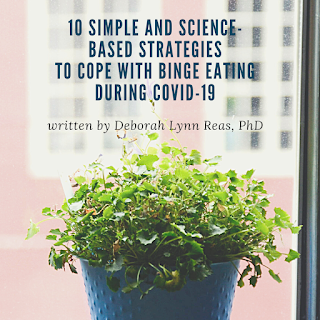Eating Disorder Research by Allison C. Kelly, Ph.D., C.Psych.
Hello
there!
My name is Allison Kelly and I’m a psychologist and professor in
clinical psychology at the University of Waterloo. My recent research has
focused on trying to understand some of the factors that lead to people
developing eating disorders and staying ill, as well as the factors that help
people get better. Below I summarize what my collaborators and I have found in
our research, and what these findings seem to suggest about how people with
eating disorders might work to overcome their eating and body image struggles.
Please be advised that these findings may not apply to every person with an
eating disorder.
1.
Shame,
more than other negative feelings, seems to keep eating disorders alive. Shame
is a painful self-conscious emotion that makes us feel as if there is something
wrong with us, something flawed, defective, and repelling. When we feel
ashamed, we often put a lot of effort into hiding what we feel ashamed about
from others because we are afraid we will be rejected or criticized. We also
try to avoid thinking about the sources of our shame because of how painful it
can be to acknowledge them. My research suggests that some of the behaviours we
see in eating disorders, like trying to restrict eating, exercising
excessively, bingeing, and purging, might actually help people escape feelings
of shame in the short-term, but ultimately perpetuate feelings of shame
long-term. This may be because these behaviours are not typical for most people
and because individuals usually perform them in secret, which only intensifies
shame and the belief that one is different and abnormal.
2.
When
people with eating disorders come to feel less ashamed of themselves, their
symptoms seem to improve. In my research, we found that among
patients who were attending day hospital or inpatient eating disorders
treatment, those who had larger improvements in shame in the first few weeks of
treatment had greater decreases in eating disorder symptoms over 12 weeks of treatment.
That is, those who came to feel less defective and flawed grew to have fewer
concerns about their eating, weight, and shape, and came to eat in a more
flexible, less rule-driven manner. These
findings suggest that the process of overcoming the feeling that there’s
something wrong with you, and the tendency to try and hide one’s
vulnerabilities from others, makes recovery more possible.
3.
Self-compassion
helps people with eating disorders feel less ashamed. Self-compassion
is a kind, caring attitude we can show ourselves when we feel upset or
inadequate in some way. It involves giving ourselves the warmth, non-judgment,
and understanding we might show a friend in a distress. So, instead of saying
self-critical things to ourselves like “You shouldn’t be feeling this upset,”
or “There’s something wrong with you for struggling like this,” a
self-compassionate approach might be to say, “It’s understandable that you’re feeling
so upset – you’ve been having a tough go of things lately” and “Most people in
your shoes would be upset – this is understandable.” It seems from my research
that the more people with eating disorders come to respond to their struggles
in this self-compassionate way, the more their feelings of shame come to
decrease. And, as shame decreases, so too do eating disorder symptoms.
4.
Cultivating
self-compassion through self-talk, letter-writing, and imagery tasks can help
people with eating disorders overcome their symptoms and their eating and
weight concerns. We conducted a study of individuals with
binge eating problems, and randomly assigned (like flipping a coin) them to
cope with urges to binge by distracting themselves with a fun or meaningful
activity, by visualizing a compassionate image and encouraging themselves with
self-compassion, or by doing nothing. We found that the distraction and
self-compassion interventions were equally effective at reducing binge eating,
but that only the self-compassion intervention reduced underlying concerns
about eating and weight. This finding suggests that although distraction may
help to change certain eating disorder behaviours, self-compassion strategies
might help people gradually overcome the issues at the root of their eating
disorder.
5.
People
with eating disorders tend to be afraid of self-compassion, and this fear can
make it difficult for them to benefit from therapy and treatment. Although
self-compassion seems to be helpful, we now know that many people have worries
about being kind to themselves: they may feel underserving of it, or they may
think that self-compassion will lead to negative outcomes like weakness,
laziness, or a lowering of standards. Although it is understandable to be
afraid of self-compassion if it is unfamiliar to you, our research shows that
people who are highly afraid of self-compassion do not benefit as much from
treatment for their eating disorder. Not surprisingly, they also benefit little
from self-compassion strategies. These results suggest that it would probably be
helpful for people with eating disorders to explore and try to work through the
worries they have about being kind to themselves.
I
hope you find these research findings useful to you in some way. I welcome any
questions or feedback at allison.kelly@uwaterloo.ca.
For
more information about my research, please visit:
References:
Kelly,
A.C., Carter, J.C., & Borairi, S. (in press). Are improvements in
shame and self-compassion early in eating disorders treatment associated with
better patient outcomes? International Journal of Eating
Disorders.
Kelly, A.C., Carter,
J.C., Zuroff, D.C., & Borairi, S. (2013). Self-compassion and fear of
self-compassion interact to predict response to eating disorders treatment: A
preliminary investigation. Psychotherapy Research, 23, 252-264. DOI
10.1080/10503307.2012.717310
Kelly, A.C., &
Carter, J.C. (2013). Why self-critical patients present with more severe eating
disorder pathology: The mediating role of shame. British Journal of Clinical Psychology, 52, 148–161. DOI: 10.1111/bjc.12006


Comments
Post a Comment